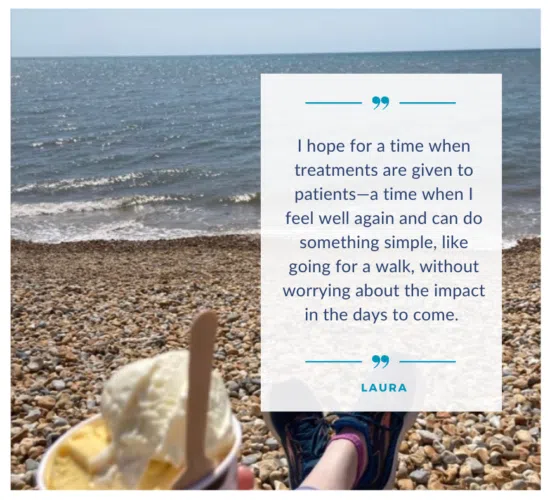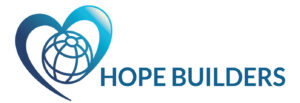Today, we share a personal story from Laura, a supporter from the UK. Her journey through Long COVID is a testament to resilience and a powerful reminder of the urgent need for research and medical education.
Your support is critical. By becoming a Hope Builder—one of our dedicated monthly donors—you can help accelerate OMF’s research and make a tangible difference in the lives of millions. Join our community of supporters and be a part of something transformative.
Laura’s Story: Life Before and After
 I developed Long COVID after being exposed to COVID-19 at work in late December 2020, just as vaccines were starting to roll out—but before I could get vaccinated. I used to work as a clinical scientist in a busy hospital. After a long time off due to illness, I returned to work on reduced hours. It was difficult to work at all with the symptoms I was experiencing, and my quality of life was poor.
I developed Long COVID after being exposed to COVID-19 at work in late December 2020, just as vaccines were starting to roll out—but before I could get vaccinated. I used to work as a clinical scientist in a busy hospital. After a long time off due to illness, I returned to work on reduced hours. It was difficult to work at all with the symptoms I was experiencing, and my quality of life was poor.
I tried to explain the condition and consequences that were unseen when I was at work, but I got a lot of grief from my line manager. They didn’t believe I was really ill and definitely didn’t appreciate the effort I was putting in or see the volume of work I was doing. Instead, I was unfairly seen as a problem and viewed negatively, rather than as someone doing a huge amount of work despite a serious ongoing illness. It has occurred to me since that disabled/ill people are easy to scapegoat.
I recently had to give up work completely, as further exposure to COVID-19 worsened my baseline function. In some ways, it was a relief since I hadn’t improved in over four years. But even the more understanding people assume there’s a linear progression to full recovery. I now have total control over my day and how much energy I expend.
I go out for occasional short walks, energy permitting, and for appointments, but otherwise, I’m now pretty much housebound/bedbound. I had to give up my home, and I no longer go out to see friends. This is a huge change from my previous life. Pre-COVID, when I wasn’t at work, I was always outdoors, either being active or socializing. I was a runner and cyclist; I did one or the other, or sometimes both, every day, even in the winter. I enjoyed yoga several times a week, ran marathons, and went on cycling and hiking holidays. On a good day, I can be up and about, doing low-energy activities like knitting or crosswords. On a bad day, I have to go back to bed.
Anything can happen to anyone, but I had hoped that by looking after myself, I would stay well for most of my life. I also believed that when you become ill, there are services to support and hopefully treat the problems that arise. Finding that there are no treatment and service options for people who become relentlessly ill after infections has been disturbing. Those who have become disabled by viral or other infections have been marginalized, and the stigma surrounding this is bizarre.
I hope for a time when treatments are given to patients—a time when I feel well again and can do something simple, like going for a walk, without worrying about the impact in the days to come.
By joining us as a Hope Builder this March, you can help us pave the way for breakthroughs that can restore lives like Laura’s.
Every journey begins with a single step, and every cure begins with the bold decision of individuals like you to invest in hope. Your monthly gift can help turn years of research into solutions we all seek. Let’s not wait for change; let’s create it together.
